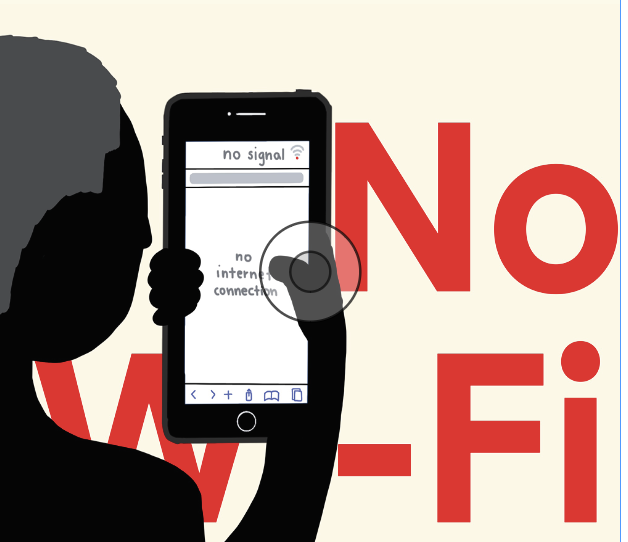
Since the beginning of the winter term, interruptions to the campus Wi-Fi network have hindered access to the internet — an essential part of Choate students’ everyday routine. To many, the ways students have attempted to resolve the issue have revealed inequities across campus.
Sophia Berdon ’24, a day student, has struggled with connecting her laptop to Choate Wi-Fi throughout the majority of this academic year. She also experienced trouble loading websites on her phone and iPad, which has regularly prolonged the time she spent on homework. As a day student, Berdon has had the option to save online assignments for when she gets home.
Not all students have the privilege to return home every day, though, and many, when the School’s Wi-Fi is not working, are forced to connect their devices to the data plan on their phones, known as a personal hotspot. However, these data plans are expensive, and not all students at Choate can access mobile data — assuming that it is available to all can cause discomfort in classroom settings.
“I was in my classes and my teacher would mention the fact that we all had hotspots,” said Cadence Secreto ’23. “She didn’t take into account that some of us didn’t. It was unsettling, and I had to speak up and be like, ‘Oh, I don’t have one.’”
“Hotspot isn’t just something you can choose to get whenever you want,” said David Garsten ’23. “You have to pay extra money in a long term plan for it.” As someone who doesn’t have a personal hotspot, Garsten often has to “ask other people for a hotspot, which has been very annoying.” Not long ago, he attended the Student Diversity Leadership Conference (SDLC), and the Choate internet was unstable. Garsten said that he “needed to be at a ton of Zoom meetings, making it impossible to attend a large portion of the conference.”
Jeff Kim ’23, a boarding student from South Korea, did not have a robust hotspot and was forced to depend on unreliable troubleshooting methods such as constantly turning the Wi-Fi on and off on his computer. Especially in his research-intensive U.S. History class, Kim said “without any hotspot during Wi-Fi shutdowns, it was impossible to get all the material I needed for that completely ready.”
The Wi-Fi issue also added stress to seniors scrambling to complete their college applications. “The Wi-Fi went out while I was submitting my college app last week,” Samuel Qin ’22 said. “It caused a lot of anxiety, as I could not find any workarounds at the moment.” The application eventually went through.
Teachers appeared to vary in their approach to accommodate for the technological inconveniences. HPRSS teacher Ms. Emily Kaplan said, “I was in a dorm that did happen to have Wi-Fi that week, so a lot of non-Hall students scrambled in, asking our residents if they could study here.”
Ms. Kaplan went on, “The Wi-Fi outage seemed to add a layer of stress to students impacted. Many of the boarding students who I teach understandably came to class not fully prepared, so I think a lot of teachers had to adjust lesson plans as well.”
There appears to have been at least one benefit from the Wi-Fi disruption. Some students remarked that because everyone had to congregate in the handful of areas that offered a stable internet connection, there was a spontaneous sense of camaraderie among students.
“I had a couple of friends who couldn’t access their virtual textbooks,” said Gaby Nirmal ’23, “so we all got together and shared pictures of the physical pages.”




